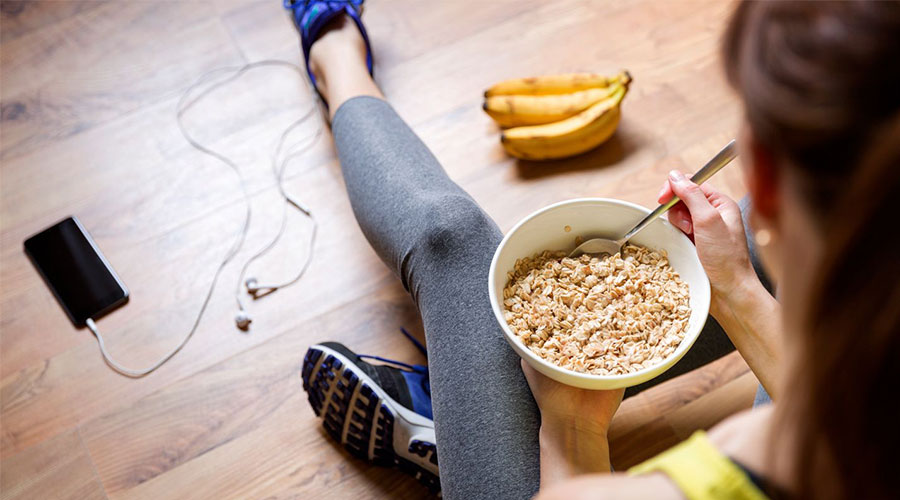Salt therapy – All you need to know
- 24 Feb - 01 Mar, 2024
Sometimes the extra effort of preparing how to re-load an empty tank seems more difficult than it actually is after planning and carrying out a workout – whether it be a challenging HIIT set or a protracted yoga flow. You may have heard that the combination of macronutrients in a post-workout snack matters when deciding which one to choose. However, there is some ambiguity surrounding the precise calibration of your macros, particularly carbohydrates. Although there has been some dissension regarding the consumption of carbohydrates after exercise, both scientific research and professional opinion support the consumption of carbohydrates to speed up recovery. In short, it's a good idea to eat carbohydrates after exercise. Discover how, when, and why you should reach for them by reading on.

You generally don't need to refuel with carbohydrates after a modest activity like a brisk walk or stretching session during your lunch break. However, if your exercise was more intense, it probably depleted your glycogen reserves, which is the body's preferred energy source for intense exercise. Muscle tissue starts to break down when the muscles' glycogen stores are low. Eating carbs is essential for supporting the body's repair and regrowth. "Carbohydrates help the body release insulin after exercise, which replenishes the glycogen stores that were just depleted during your workout. Pairing carbs with protein improves how well they accomplish this. The pace at which the body stores glycogen is accelerated by the combination of proteins and carbohydrates.
A crucial macronutrient for post-exercise recovery is carbohydrates. Here are four good reasons to enjoy a plate of potatoes or a bowl of pasta after a strenuous workout.
You could feel as though you're running on fumes when you've depleted your stockpiles because the body likes to use glycogen for energy during vigorous activity. Reintroducing carbohydrates to your diet can make you recover more quickly and with less fatigue. Additionally, studies show that eating carbohydrates after exercise increases one's capacity for endurance during subsequent workouts. Having a high-carb snack today could help you perform better tomorrow.
Your blood sugar levels drop when you exercise in most cases. Never hold off on grabbing a food that is high in carbohydrates to bring your glucose back in the positive range. By doing this, you can avoid unpleasant hypoglycemia symptoms including trembling, headache and a quick heartbeat.
Although you may believe that protein is the only macronutrient that helps you gain muscle, carbohydrates also play a supportive role in this process. Amino acids are the building blocks of protein, and carbohydrates help them reach muscles more quickly, accelerating muscular growth and recovery.

In response to low blood sugar, cortisol – often referred to as "the stress hormone" – increases. It's possible that replenishing your carbohydrate reserves to maintain a stable blood sugar level will also lower cortisol levels.
You may ask whether all carbohydrates are created equal when it comes to post-workout eating now that you are aware that they are okay to eat after your cool-down. Not quite. Complex carbohydrates would be ideal because they are easily converted to glycogen. Complex carbohydrate foods include whole grains, vegetables, beans, and potatoes, which are also high in fibre. That said, eating high-fibre foods soon after engaging in vigorous exercise may occasionally cause digestive issues. Simple carbohydrates may be tolerated better post-workout. To find the nutrients that are most effective for you, it is crucial to experiment with different combinations while training.
The following recommendations are made by specialists regarding the ideal carbohydrate intake: Typically, 15 to 45 grams of carbohydrate (with more carbs after harder sessions) would be reasonable after a workout. It has been demonstrated that a ratio of 3-4 carbs to proteins is advantageous. By replenishing the glycogen stores depleted during workout sessions and repairing muscular damage, this combination enables your body to recuperate.
It's crucial to eat carbs within a specific window of time after working out to benefit from them. The Academy of Nutrition and Dietetics advises consuming carbohydrates an hour after a strenuous activity. Just be mindful of your own tolerance for eating right after exercise; some people may prefer to consume full meals, whereas other bodies function best with a snack followed by a meal a little later.
COMMENTS